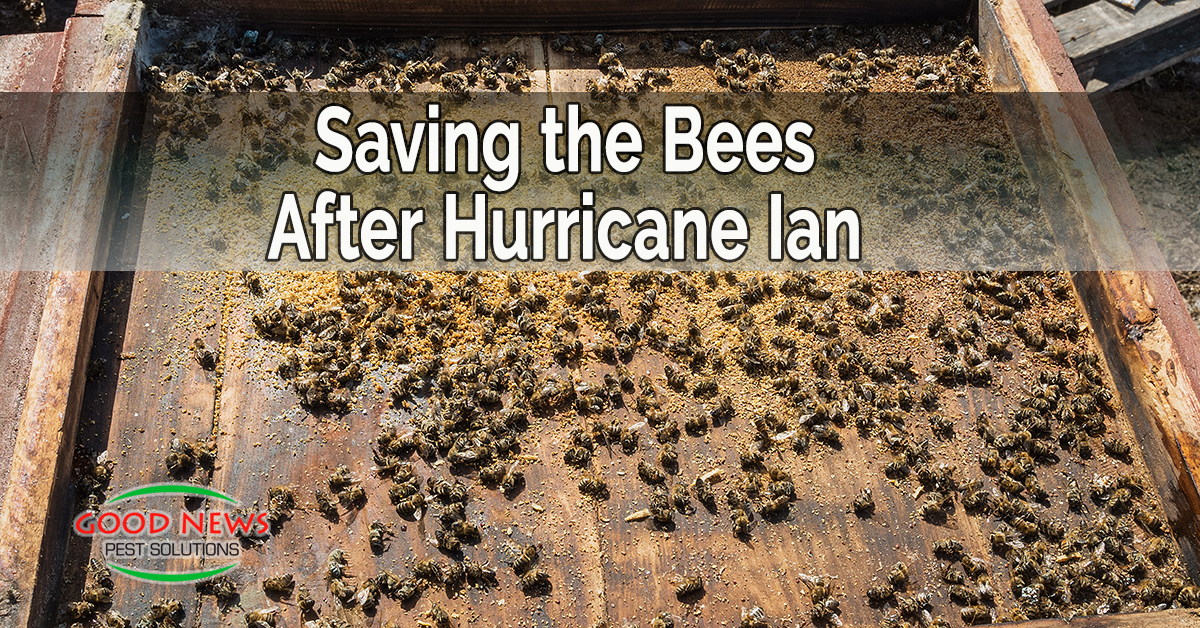
Saving the Bees After Hurricane Ian
It’s been more than 110 days since Hurricane Ian made landfall. Yet some areas of our beautiful Gulf Coast of Florida still look like the storm hit only a few hours ago. Thousands lost their homes, countless more their precious belongings. It’s been judged the third costliest storm in history after Katrina and Harvey.
Sadly, the financial damage and loss of physical items did not necessarily make the largest long-term impact from the Category 4 hurricane. Other damages may take months or even years to realize. No, the recent ‘egg-flation’ is not connected to Hurricane Ian.
However, many more agricultural items, already expensive due to rising inflation and supply chain shortages, could get even rarer and more expensive thanks to a side effect of the storm. But it could have been worse had it not been for the quick action of some folks at a Seattle-based non-profit.
The Happening That Could Have Been
It’s been a growing issue for years. We’ve mentioned before how bees and pollination are the backbone of American and international agriculture. The scariest thing about the steady decline in bee populations over recent years is that it could make some foods not only more expensive but potentially non-existent.
While bees are not the only pollinators in the insect kingdom – butterflies and mosquitoes do their part – they are the primary pollinators for approximately 80 percent of all flowering plants. That includes at least 130 different types of vegetables and fruits. Almost as far back as Darwin, it was noted that cattle relied on bees (and cats?!) for survival and without bees there would be no beef.
Some have even speculated that without bees it would take somewhere between a mere four years and a generation for human life on the planet to cease.
Yet, in all the hours and hours of hurricane coverage, newscasters almost unanimously neglected to mention one particular storm “surge.”
400,000 Florida bee colonies sat in Hurricane Ian’s path throughout the Sunshine State. The storm decimated 100,000 hives. Surviving bees were left fruitlessly searching for food sources because of the storm’s destruction of foliage, the source of bees’ energy and protein.
It should also be noted that Florida bees don’t just work on Florida crops. Beekeepers in Florida lease their bees to California for the almond harvest. Afterwards, they are shipped to Montana for alfalfa pollination, then to Washington, Oregon, Wisconsin, Ohio, Indiana, Illinois, Pennsylvania, North and South Dakota, and New England – pollinating hundreds of fruits and vegetables before returning to Florida.
Sticky Between The Gaps
Beekeepers across Florida are buzzing about Greater Good Charities.
Utility workers went across the state restoring power, water and internet. Former refugee boaters picked up people stranded on Sanibel and Pine Island. Government employees, and in many cases newly homeless and unemployed citizens, worked to rebuild bridges and other damaged or destroyed infrastructure. And Mann Lake Bee Ag & Supply coordinated the distribution of thousands of pounds of syrup and pollen substitute to beekeepers, thanks to some conscientious folk in Seattle (Dadant & Sons Inc. and South Florida Bee Supplies LLC also donated supplies).
It’s estimated that their efforts, which did not stop with the initial syrup distribution, kept 1.7 billion bees alive and productive. The initial goal was to keep the bees alive for 30 days. Since then, the charity has also partnered with the University of Florida and the Florida Beekeepers Association to provide more than 500,000 pounds of syrup and 113,000 pounds of pollen substitute, as of Christmas.
While talk of the bees and Hurricane Ian have now slipped from the national consciousness in the wake of the critical flooding in California, Greater Good Charities is still taking Southwest Florida specific bee donations on their website.
Of course, our prayers are with our neighbors and friends who were affected by Hurricane Ian. As our area carries on their rebuilding, we’ll continue to provide the safest, most effective pest solutions in the state. We offer our Go Green Perimeter Plus to existing homes and offices, as well as pre-purchase inspections for new home buyers. For more details or to schedule your first appointment, just give us a call!
« Back to Blog
Proudly Serving
Sun City Center, Ruskin, Palmetto, Parrish, Ellenton, Bradenton, Anna Maria, Holmes Beach, Bradenton Beach, Longboat Key, Lakewood Ranch, University Park, Myakka City, Sarasota, Siesta Key, Osprey, Nokomis, Casey Key, Venice, Englewood, North Port, Port Charlotte, Punta Gorda, Arcadia
Things You Can Do
Pay Your Bill Online
Leave Us a Review
Request a Free* Termite Inspection
Stop Mosquito Bites
Get Rid of Rodents
Get a Termite Damage Warranty
Get Pest Control for Your Attic
Get Pest Control for Your Business Request Prayer
Corporate Address
1080 Enterprise Court, Ste A
North Venice, FL 34275
Call Now: (941) 412-9610
Text: (941) 412-9610
Fax: (941) 412-0080
